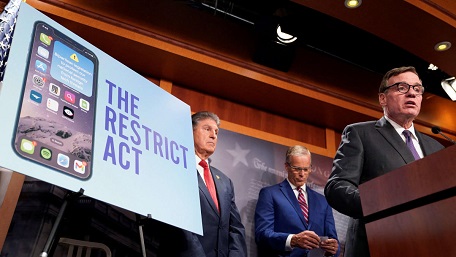America’s New RESTRICT Act Besides Banning TikTok Will Make It Illegal To Use VPNs With Users Facing Jail Of 20 Years Or A Million Dollars Fine!
America’s New RESTRICT Act Apr 02, 2023 2 years, 1 week, 4 days, 10 hours, 3 minutes ago
The bipartisan "Restricting the Emergence of Security Threats that Risk Information and Communications Technology (RESTRICT)" act, initially dubbed the "TikTok Ban Bill," has far-reaching implications beyond social media. If passed, the legislation could severely impact virtual private network (VPN) users in the United States, as well as various other communication services and platforms.

According to the bill, anyone using VPNs could face a jail time of 20 years and or a fine of up to one million dollars!
The act aims to counter technology associated with a select group of "foreign adversaries," including China (encompassing Hong Kong and Macau), Cuba, Iran, North Korea, Russia, and Venezuela.
VPNs users, often used VPN services to enhance security for web communications and access content that may be blocked or censored, could face substantial fines or jail sentences under the bill.
However, VPNs are not the only targets of the proposed legislation. Ambiguous phrases in the bill, such as "desktop programs," "mobile apps," "gaming platforms," "payment solutions," and "web applications," could potentially include a wide range of communications technologies, including web hosting, cloud services, content delivery services, drones, artificial intelligence, and e-commerce.
According to digital rights experts, the
RESTRICT Act contains "insanely broad" language and raises significant human and civil rights concerns. For example, the legislation's broad scope could criminalize the use of VPNs, impacting access to security tools and applications essential for privacy and security. This would have serious consequences for vulnerable groups, including journalists, activists, and human rights defenders, who rely on VPNs to protect their online activities from surveillance and censorship.
Furthermore, the legislation could grant the U.S. government extensive powers to crack down on any technologies and services it deems a threat, possibly violating the First Amendment.
Critics argue that while the RESTRICT Act may be motivated by legitimate privacy concerns, banning information and communications technology (ICT) services with connections to foreign countries would not necessarily protect Americans' privacy. These countries could still obtain data through other means, such as by purchasing it from private data brokers.
The proposed legislation has garnered support from both Republican and Democratic Senators, including Mark Warner (D-VA) and John Thune (R-SD), who introduced the bill.
However, experts like Willmary Escoto from Access Now and Caitlin Vogus from the Center for Democracy & Technology's Free Expression Project have called for a more comprehensive privacy law, such as the American Data Privacy and Protection Act, as a more effective way to address privacy risks.
Despite the controversy surrounding the RESTRICT Act, lawmakers are pushing forward with the bill, following the recent questioning of TikTok CEO Shou Zi Chew.
The Chinese social media platform has an estimated
150 million users in the United States, and House of Representatives Speaker Kevin McCarthy is convinced that China has access to TikTok user data. He seeks to "protect Americans from the technological tentacles of the Chinese Communist Party."
As the RESTRICT Act progresses, questions about the bill's implications for privacy, security, and internet freedom remain at the forefront of the debate. Critics argue that the legislation's broad scope and potential to erode internet freedom in the name of national competition are reminiscent of China's Great Firewall, a virtual barrier that enforces strict internet control policies.
As the debate around the RESTRICT Act continues, concerns about its impact on internet freedom and privacy are growing. Experts argue that the legislation's broad scope and potential to erode internet freedom in the name of national competition are reminiscent of China's Great Firewall, a virtual barrier that enforces strict internet control policies.
Balaji Srinivasan, the former CTO of Coinbase, maintains that the RESTRICT Act creates a virtual barrier within the United States, emulating China's strict internet control policies with the stated goal of competing with and surpassing the Asian powerhouse.
Opponents of the bill believe it would give the state power to police the entire internet and any platforms on it, potentially leading to the "Chinafication of America." The legislation's similarity to China's stringent internet censorship raises alarm for many who value internet freedom and privacy.
Some lawmakers, such as Congresswoman Alexandria Ocasio-Cortez, have taken to social media to address the need for nationwide data and privacy protection policies. Ocasio-Cortez stated that the core issue is not TikTok, but rather social media companies collecting "troves of deeply personal data" from users.
Despite the concerns, proponents of the RESTRICT Act argue that it is necessary to counter the growing influence and security risks posed by foreign adversaries in the technology space. They contend that the bill is aimed squarely at companies like Kaspersky, Huawei, and TikTok, which create systemic risks to the United States' national security.
Rachel Cohen, communications director for Senator Warner, stated that the threshold for criminal penalty in the bill is incredibly high—too high to ever be concerned with the actions of individual users of TikTok or a VPN. However, the bill's critics remain skeptical, citing the potential for abuse and overreach in its implementation.
As the RESTRICT Act advances, the debate over its implications for privacy, security, and internet freedom will undoubtedly continue. The outcome of this legislation could have far-reaching consequences for VPN users, social media platforms, and the broader technology landscape in the United States.
At all costs..all Americans should oppose this bill as it could put the United States into the dark ages and there would be complete loss of freedom on the internet.
While it is correct for the United States to ban Tik Tok, the Restrict Act Bill should not be passed but instead a new bill should be drawn up to only focus on the ban of Tik Tok.
For the latest on the Restrict Act Bill, keep on logging to Thailand Medical News.
